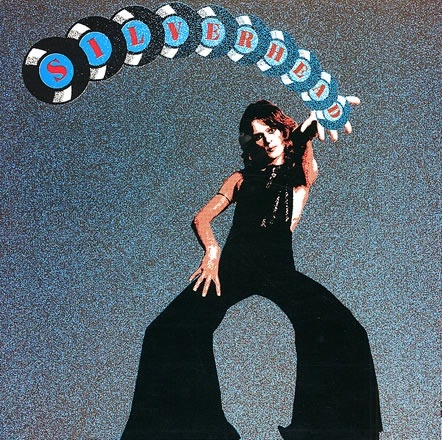
If Rodney Bingenheimer is the Mayor of Sunset Strip, then Michael Des Barres is the Strip’s Lord Chamberlain, Knight of the Garter, and Poet Laureate. He is what would result if you combined the DNA of a young Rod Stewart, Marc Bolan, Lord Byron, Percy B. Shelley, Heathcliff, Lothario, and every aristocratic hero (he is a marquis) from every Barbara Cartland romance novel.
Michael Des Barres started out his professional life as a young actor. He attended drama school at sixteen after years at elite British private boarding schools. He appeared on television in the U.K. (Whack-O!, The Bruce Forsyth Show, Mrs. Thursday), West End theatre (The Dirtiest Show in Town, performing in the nude), and in the film To Sir, With Love. Most Americans recognize him from his acting roles here: Mulholland Drive, Roseanne, NCIS, Ellen, Melrose Place, and MacGyver.
Some of us caught an early glimpse of him in 1978 as a punk rocker on WKRP in Cincinnati. Musically his vampy joie de vivre as Robert Palmer’s replacement as lead singer for The Power Station at Live Aid in 1985 was legendary. A diminuitive friend of mine who saw Des Barres for the first time at Live Aid immediately went about studying and desperately copping his stage moves.
Those stage moves were carefully honed in three short-lived bands: Silverhead, Detective, and Chequered Past (which also featured Steve Jones). The British glam-rock band Silverhead, consisting of Michael, bassist Nigel Harrison (who later joined Blondie), guitarist Rod “The Rook” Davies, drummer Pete “Tommo” Thompson, and guitarist Steve Forest (replaced by Robbie Blunt), formed in 1972. They were young, glamorous, and skinny, so scrawny that Michael once joked that their collective weight was about 150 pounds. They released two studio albums, Silverhead (1972) and 16 and Savaged (1973), and one live album, Live at the Rainbow (1975), on Purple Records, Deep Purple’s label. They were dirty, raunchy (“More Than Your Mouth Can Hold,” for example), and fun, a hard-partying, kohl-wearing feature of the burgeoning glitter scene, where Michael befriended, among others, Marc Bolan. They toured extensively throughout the U.K., Europe, Japan, and the U.S., opening for Kiss, Nazareth, Osibisa, Fleetwood Mac, Uriah Heep, and Deep Purple. When Michael fell offstage and broke his arm in the U.S, it did not slow him down. His cast was spray-painted silver to match his hair, and they kept the party going.
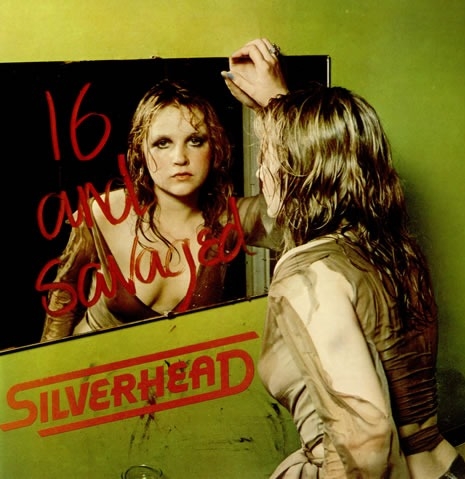
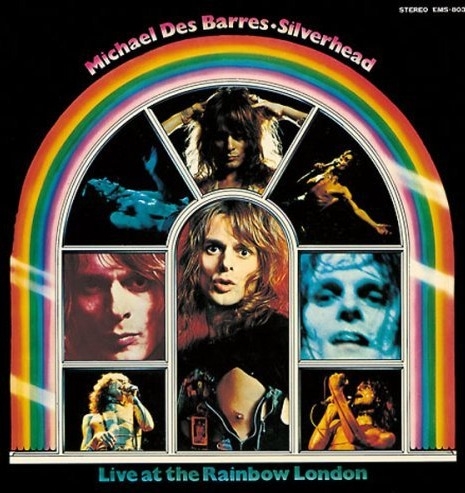
Silverhead were supposed to be the Next Big Thing, poised to conquer the American music market. Unfortunately it never happened. Their sales were disappointing, and they did not reach the same sphere of popularity as T. Rex, Slade, or Sweet. Then they imploded, abruptly breaking up in the middle of working on their third album (Brutiful) in 1974. Michael relocated to L.A. permanently and eventually married The GTO’s Miss Pamela, whom he had met on the set of the movie Arizonaslim when he was a last-microsecond replacement for Keith Moon.
Pamela wrote about her first impression of Michael in her first memoir I’m With the Band: Confessions of a Groupie, calling him “a degenerate drug-taking sex-dog toting two bottles of Southern Comfort, wearing two dozen silver bracelets on each arm” and “...a well-bred lunatic with an abundant vocabulary who drank like a school of fish.”
Silverhead has earned a new generation of young fans, thanks to the internet. They reunited last year for a series of concerts in Tokyo and just settled on another reunion scheduled for next year. I talked to Michael this week about the origin of Silverhead and their brief few years of glory. We ended up talking about a lot of other things, including 12 Step programs, drugs, art, and books. He’s read the recent list of David Bowie’s top 100 books and concurs with it, but would add classics like Hemingway, Tolstoy, Twain, Genet, Henry Miller, Rimbaud, Shakespeare, Sartre, Patti Smith, and Serge Gainsbourg. He doesn’t like Bukowski: “I’d rather read Steinbeck.”
He also told me that he prefers real books to Kindles, as does his long-time friend Jimmy Page. “If someone gave Jimmy a Kindle, he’d give it to a member of his staff to start a fire with.”
Dangerous Minds: When did you first get the idea to form Silverhead?
Michael Des Barres: I was doing a huge musical in London called The Dirtiest Show in Town, and Andrew Lloyd Webber came to see it because it was produced by Robert Stigwood, who of course ended up producing Jesus Christ Superstar. I ended up singing on the demos for that in the role of Judas. We got along great, and he said, “You should be a rock and roll star.” I was playing an androgynous sort of character in this musical. I played this angrogynous rock star, which I then became. He said, “You should be in a band. Write some songs immediately.” So I wrote a song called “Will You Finance My Rock and Roll Band?” and he did. He got me a record deal at Purple Records. We put a ad in the Melody Maker, which was the music paper, the de rigueur music source of information in London at that time in 1971. The ad said, “Wanted: erotic relaxed musicians.” These ne’er-do-wells showed up, skinny with floppy hair and eye makeup, and we formed a band called Silverhead.
Within three months we were in Japan playing these gigs, unbelievable response, because we had white faces, it was glamourous, it was kabuki, it was bluesy, it was decadent. Then we came to the states and played to eleven people in Cleveland. You know how it is, “big in Japan.” But fantastic experience, Silverhead, great band. Authentic, degenerate. We led that life. I met Miss Pamela. I left England. I moved in with Miss Pamela in 1974. The band broke up. It was a short-lived, explosive moment. We’re going back in March, funnily enough. That just happened this week. It should be lovely, because that’s closure. It ended in a cloud of hashish and acrimony.
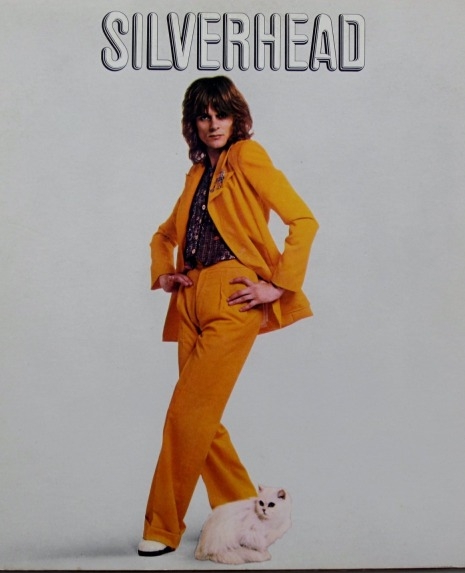
When we first came to L.A. Rodney was at the airport with three carloads of gorgeous girls. What he would do, he would read the NME, read the Melody Maker, so he was a real Anglophile, obviously. He knew exactly what was happening. We were described as “the dirtiest band in Britain.” We’d be up for ten days on coke and we let everybody know it. We thought that was cool, and it was cool. He said, “Come on, I’ll take you to the Riot House, and I’ve got some friends with me.” “Oh, okay.” The traditional Riot House, where Zeppelin and people jumped off the roof. That was the beginning of our friendship with Rodney, which I treasure to this day. I’d do anything he asks me to do, always, because he was so instrumental in helping so many people, specifically us. We would go to his club, Rodney’s English Disco, and it was so tiny that there was one table in the VIP area, one little velvet rope. So you’d have Plant and Page and Iggy and me and Miss P and a bunch of girls, Sable [Starr] and various girls of the era, and nobody else in the club. We’d be there behind the velvet rope. It was madness. It was so eccentric and wonderful and unrepeatable. You could never repeat that atmosphere again, because rock and roll isn’t rock and roll anymore. I mean, in the sense of the velvet and the drugs and the youth and the sexuality. Now it’s Adderall. Then it was coke. Even the drugs were more interesting. Now it’s very aggressive or very gentle. They’re all David Crosby. Mumford and Crosby and Sons or jagged and angry. We weren’t any of those things. We were too stoned to be angry. So it was a different era.
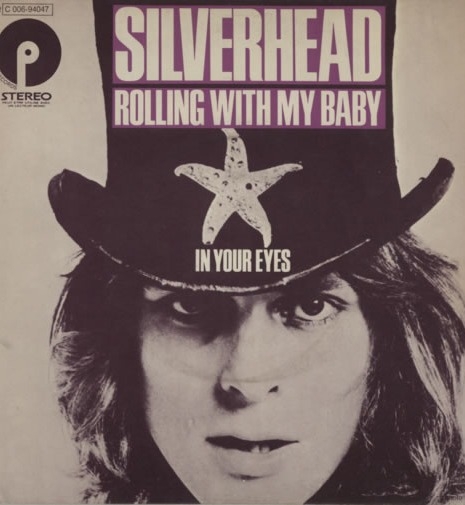
DM: After only two albums, why did the band break up?
MDB: Implosion. Drugs. Lack of focus. No record sales. Cult status. You can’t live on cult status. You can for a while, but then you become bored. I decided to get off my couch and go to America. It was divine while it lasted. Given the internet, and its extraordinary connections throughout the world, Silverhead has become something that it wasn’t then, actually a merchandisable concern. It’s considered one of the most authentic bands of that era, and it was.
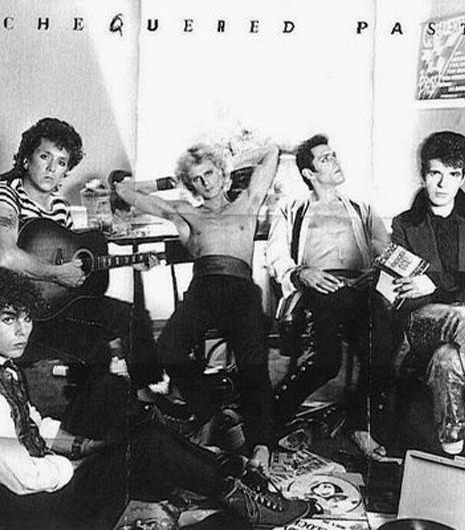
DM: When did you meet Steve Jones?
MDB: He says he stole a Silverhead album. That was the first thing he said to me. Apparently we met at Dingwalls, which is a club in London. At the end of Detective, the night I saw them, I just thought the jig was up. I was there at Winterland [The Sex Pistols’ last gig], which is where we really met and talked, me and Cookie. I was in this sludgy, hard rocking, metal, ploddingly heavy band, and then they came in and blew my mind. He is the greatest guitarist ever. I thought “I like that.” He just did my radio show last week. I love him. Chequered Past was a great live band. The album (Chequered Past) did not catch what the band was about. We were caught in a trap. We were broke. Several of the members of the band were, shall we say, chemically altered. One thing led to another and we got this producer who was wildly inappropriate. Some of the record I love. Some of it is fantastic, but the live shows were where that band was at. There were a lot of problems with that band. I had just gotten off drugs, narcotics, and I was a couple of years clean. I was ahead of the curve, as it were, and therefore there was a certain divide within the nexus of the band.
DM: Pamela mentioned in her second book [Take Another Little Piece of My Heart: A Groupie Grows Up] that when Steve lived with you, he disappeared right when you were moving from one house to another, and you had to leave his belongings in a trashbag on the porch for him. Did he ever get his stuff back?
MDB: No, I sold it to Sex Pistols memorabilia collectors from Japan. No, I’m joking! The trash on the porch [story] is bullshit. What he did was sell all my leather clothes to buy dope. He confessed this to me later, but I love him. Drugs suck. He is the most honest man I’ve ever known, because he doesn’t have the sort of sophistication to make it up, to lie. Only when he was using was he untrustworthy. The rest of his life is blemishless when it comes to telling you exactly how he feels, and that’s what his music is. It tells you exactly how he is feeling. There’s no ifs, ands, or buts with The Sex Pistols. It’s very clear what they’re doing. I think any great artist has that ability, as an artist. As a human being, narcotics will put you on various tangents that stray from the truth. He’s an amazing man. I love him to death.
DM: Was there any kind of culture shock for you when you moved from England to L.A.?
MDB: I was too stoned to think of shock and cultures. My life has been a big bubble of joy and debauchery. It has yet to burst.
DM: You recorded your first solo album, I’m Only Human, with Mike Chapman. What was it like working with him?
MBD: It was great. He’s monstrously a control freak, but I’m an out-of-control freak. Nicky Chinn was fantastic to me. Thanks to my friendship with Jimmy Page and Miss Pamela, I signed Detective to Swan Song. What happened was, when you worked with Peter Grant, he grew up as a gangster, so he never let anyone go. So when Detective imploded, they wouldn’t let me out to do anything else. They had this tough, shark New York mob lawyer. Nicky Chinn was from the East End of London, a boy made good. What the subtext of that is that they were, shall we say, from similar backgrounds. Nicky Chinn was the only one he would let me go to. Everybody wanted me then. All the record companies were interested when we did our showcase. We had great songs. Nigel [Harrison] was on bass, and it was incredible. I’m in Chinn’s debt, because he pulled a couple of strings on a brotherhood of the streets level with Peter Grant, and I got to work with Chapman. There’s a gentle chaos about Mike Chapman, but I had a fantastic time with him. I love people who take charge. I love a good director, as an actor, because you can collaborate seriously, and you can do as you’re told. I like that. I like to respect people I have faith in. I’m such a Type A personality that I’ll just bamboozle people, to a fault. I love collaboration with people who are strong with a tough-minded view.
DM: Was it difficult to be in that kind of environment in L.A. after you got clean?
MDB: No, I became incredibly self-righteous, because everyone around me was repeating themselves and endlessly talking about what happened when they were five years old. I thought, “My God, you fucking morons.” Now I embrace and love everyone, regardless, most days. I was a pariah, a leper, because it was so uncool. You had to be Keith Richards stoned or you weren’t credible. This is how dumb-fuck rock and roll can be. Spinal Tap is Chekhov compared to the real thing. The monosyllabic grunting, but most of all the copying of precedents, setting up of archetypes like Keith Richards and then being emulated by everyone else. Being the most stoned person in the room became more important than a good song, and I could see that, because I was in a rare minority of people who were getting sober. It was the most uncool thing you could do. This is ‘81. The ‘80s were flooded with Peruvian product – which is a great band name, by the way – and I was not stoned, and so therefore one could be removed and objective about what was going on.
I had a lot of growing up to do. That’s for kids, drugs and alcohol. There’s a certain level of maturity, if you can enjoy a glass of red wine and enjoy the vintage, enjoy the taste, the bouquet, that’s fine, but swilling it down like some desperate barbarian is not my idea of a good life. I live a cool, precise, disciplined, beautiful, celebratory life, but that’s not because I go to AA and listen to people whine about their agent in Hollywood. That’s not my thing either. But I’m of service to everyone I come across. I treat everyone with love and respect, especially being in the business as long as I have and lasted as long as I have. You have to be kind, because it behooves you to be so, apart from the morality of it. When I’m doing a TV show, and the first day I learn everyone’s names, and on the second day when I come in I go, “Hi Bill, how are you doing? Fantastic to see you,” “Good morning, Carla,” “Oh, hey Larry.” People go “Oh, he’s alright. I’ll put some good lighting on him.” It’s as simple as that. By good light I also mean the metaphor of good light. There’s upbeat, beautiful, spiritual work to be made, and if you’re uptight and you’re hungover, you can’t wait to get to the dressing room to have a hit of this and a hit of that, good luck. It’s going to be a miserable existence.
– snip –
Look at my life, it’s been a series of events that have been really unpredictable. So what I learned very early on is to be prepared. Robert Palmer? Live Aid? Two weeks before that I was in Miami with Don Johnson having a laugh. “Obsession” was #1 all over the world and I wrote the lyrics in three minutes, and I wrote them about drugs. That’s all I heard when I got sober was “obsession, obsession, obsession.” I wrote this lyric that made me millions of dollars. Things in my life have been absolutely unpredicted, and there’s a reason for that. Be ready. Be prepared for something wonderful to happen and it will. I guarantee it. I live that sort of life.
Michael has two radio shows, Roots and Branches and The Michael Des Barres Show. Like some kind of anti-Howard Stern, he is entertaining and funny while still having a kind word for everyone.
He is narrating Frank Zappa’s 200 Motels at the Disney Hall in L.A. with an 18-piece orchestra from the L.A. Philharmonic in two weeks. He has written a musical based on the life of the Marquis de Sade, formed a new band in 2011, and is the subject of an upcoming documentary. In addition to being so busy at age 65, you can still cut diamonds on those cheekbones.
Silverhead, “Rolling With My Baby”: